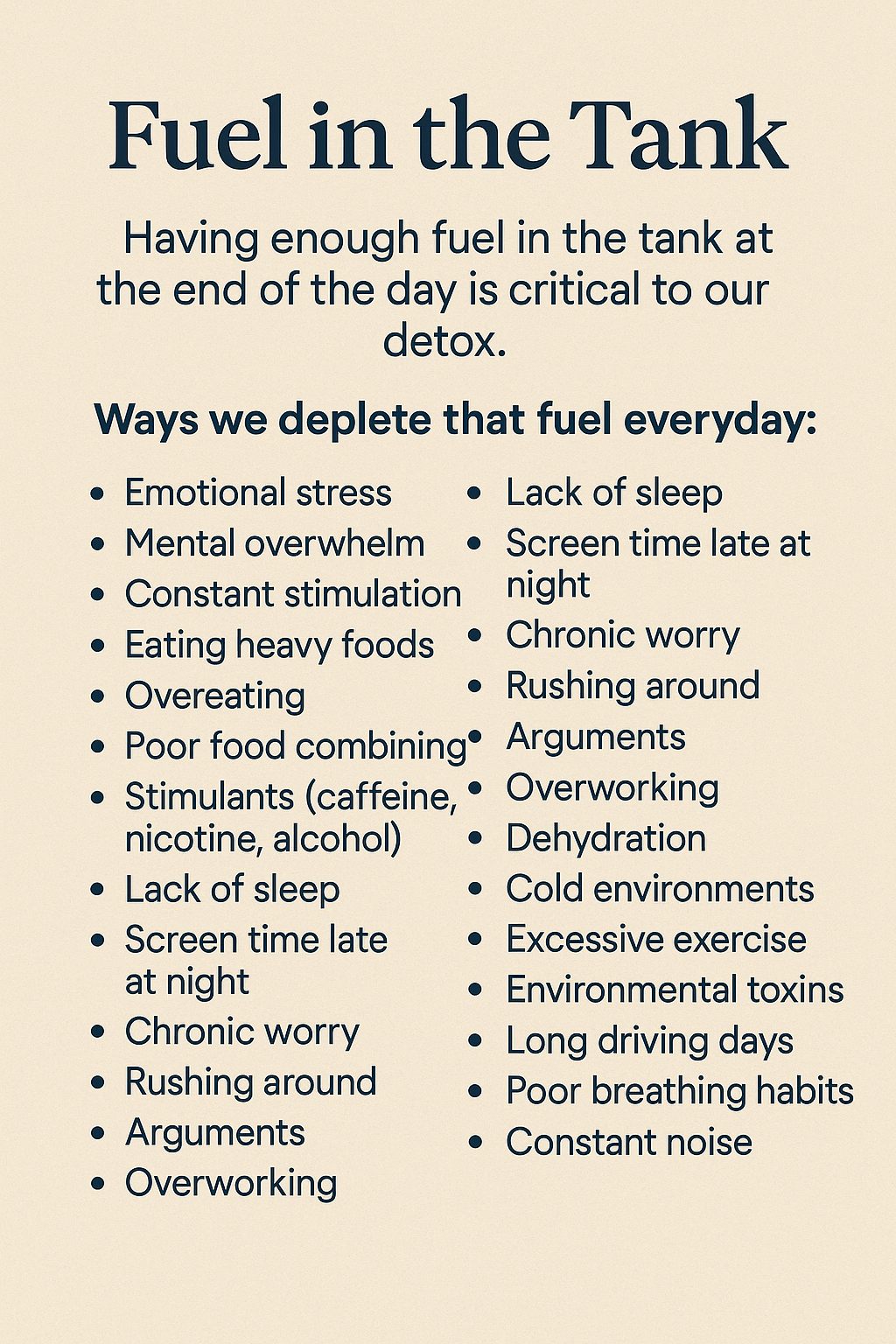Detox is not something you take, buy, or force. It is a natural biological process that your body performs every single day, and especially every night. But here’s the part most people never realise: detox only happens when you have enough fuel in the tank at the end of the day. Your body is always prioritising survival first. If all your energy is used up on stress, digestion, stimulation, emotions, work, and daily pressure, then there is nothing left for cleansing, repair, and restoration. Detox is an energy-dependent process, and when your tank runs empty, healing is postponed. That’s why so many people feel stuck, inflamed, or sluggish even when they’re “trying to be healthy”. They simply do not have enough energy left for the body to get on with its nightly house-cleaning.
Think of your body as an intelligent energy manager. Throughout the day, it’s constantly allocating resources to keep you functioning: thinking, moving, digesting, responding to your environment, handling emotions and coping with stress. Each of these tasks draws energy away from your internal healing processes. By the time the day ends, most people have completely drained their reserves without realising it. They collapse into bed already in deficit, and the body has to prioritise basic maintenance over deeper detoxification. Over weeks, months or years, this chronic lack of “fuel in the tank” gradually contributes to symptoms, fatigue, inflammation, and the inability to cleanse efficiently.
There are many everyday ways that we unknowingly burn through our fuel. Emotional stress is one of the biggest drains. Worry, conflict, anxiety, and suppressed feelings all activate the nervous system, pulling energy away from repair. Even silent stress, the kind you carry in your thoughts, uses enormous energy. Mental stimulation also depletes reserves: constant scrolling, problem-solving, decision-making, notifications, and multitasking keep the brain on high output all day long. The body cannot cleanse deeply when the mind is constantly switched on.
Food choices are another huge energy drain. Heavy meals, excessive fats, overeating, processed foods, and poor food combining require large amounts of digestive energy. Protein and mixed meals can take hours and hours to process, leaving very little left over for healing. Stimulants such as caffeine, alcohol, nicotine, and sugar give a brief sense of energy but ultimately exhaust the tank further by forcing the body into a false state of stimulation. Instead of contributing energy, they borrow it from tomorrow. By evening, the body is already running on fumes.
Environmental and lifestyle habits also contribute. Long work days, rushing around, constant responsibilities, late nights, dehydration, heavy exercise, excessive talking, cold weather, noise, artificial lighting, and screen time at night all sink more energy than people realise. Even things like shallow breathing, poor posture, or holding tension in the body can gradually deplete energy reserves. When you add all of this together, it’s easy to see why the average person never reaches the place where detox can actually happen fully.
The body prefers to detox when you are deeply rested, parasympathetic, calm, and quiet. That’s why during sleep, especially early in the night, the body moves into its most powerful cleansing state. But this only happens if you preserved enough fuel through the day. When you protect your energy, simplify your meals, go to bed early, reduce stimulation, hydrate properly, and create emotional calm, your body has the resources it needs to switch into full restoration mode. Detox doesn’t need pushing. It happens automatically when the conditions are right.
The key message is simple: your energy is your healing currency. Every choice in your day either invests in your tank or drains it. When you consciously protect your reserves, your body will naturally do what it has been designed to do for millions of years. You don’t have to force detox. You simply have to stop spending all your fuel before the day is even over.

